Kelter P., Mosher M., Scott A. Chemistry. The Practical Science
Подождите немного. Документ загружается.

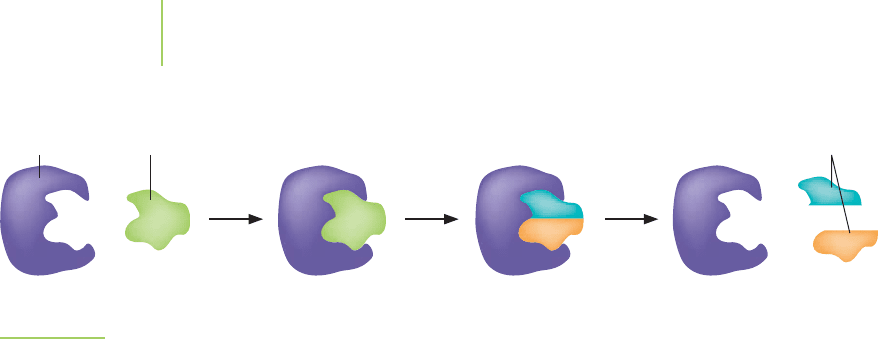
our cells is quite fast; some are so fast that they must pause and wait for molecules
to arrive at the reaction site. What type of compound makes these reactions fast?
Specific types of proteins in the body, known as enzymes, catalyze these reactions.
A few key principles govern enzyme catalysis. This process is summarized in
Figure 22.23.
■
Enzymes contain specific sites to which certain chemicals can bind.
■
The structure of the sites enhances the binding of specific molecules and ions
through the same type of intermolecular forces of attraction that we discussed
in Chapter 10.
■
One of the binding sites on an enzyme includes the active site where the sub-
strate
binds.
■
The enzyme next catalyzes the reaction of the substrate and produces the
product, which is then released from the enzyme.
Cofactors, Coenzymes, and Protein Modifications
Regulation and control of the activity of an enzyme is often necessary. Imagine,
for instance, what would happen if all of the sucrose you just consumed at lunch
were immediately converted into energy. That energy would be used up quite
quickly in the biological processes that keep you alive. After a very short time,
your body would be out of energy, and the basic reactions that keep you
functioning would stop. This suggests that the reactions within a cell must be
regulated—turned on and off—so that they are performed only when needed.
This regulation often involves chemical modification of the enzyme. The major
modifications are as follows:
■
Incorporation of specific metal ions at appropriate sites, to form metallopro-
teins, in which metal ions are tightly bound within the protein structure, or
metal-activated proteins, which are activated by loosely bound metal ions
picked up from the surrounding solution
■
Incorporation of loosely bound small chemical groups called coenzymes at
specific sites within the protein
■
Incorporation of tightly bound prosthetic groups, often held to the protein by
covalent bonds
■
Covalent linking of phosphates to specific sites to form phosphoproteins
■
Covalent linking of carbohydrates at specific sites to form glycoproteins
■
Covalent bonding of lipids at specific sites to form lipoproteins
The need for many enzymes and other proteins to be modified in these ways ex-
plains many of our nutritional needs for specific minerals and vitamins. For in-
stance, much of the iron that we must consume in our diet is needed to provide
948 Chapter 22 The Chemistry of Life
FIGURE 22.23
Substrates bind to the active site of an enzyme. The enzyme then catalyzes the reaction and
releases the products. The enzyme is then primed for the next reaction.
E
++
Free
enzyme
SES
Free
substrate
EP EP
Free
products
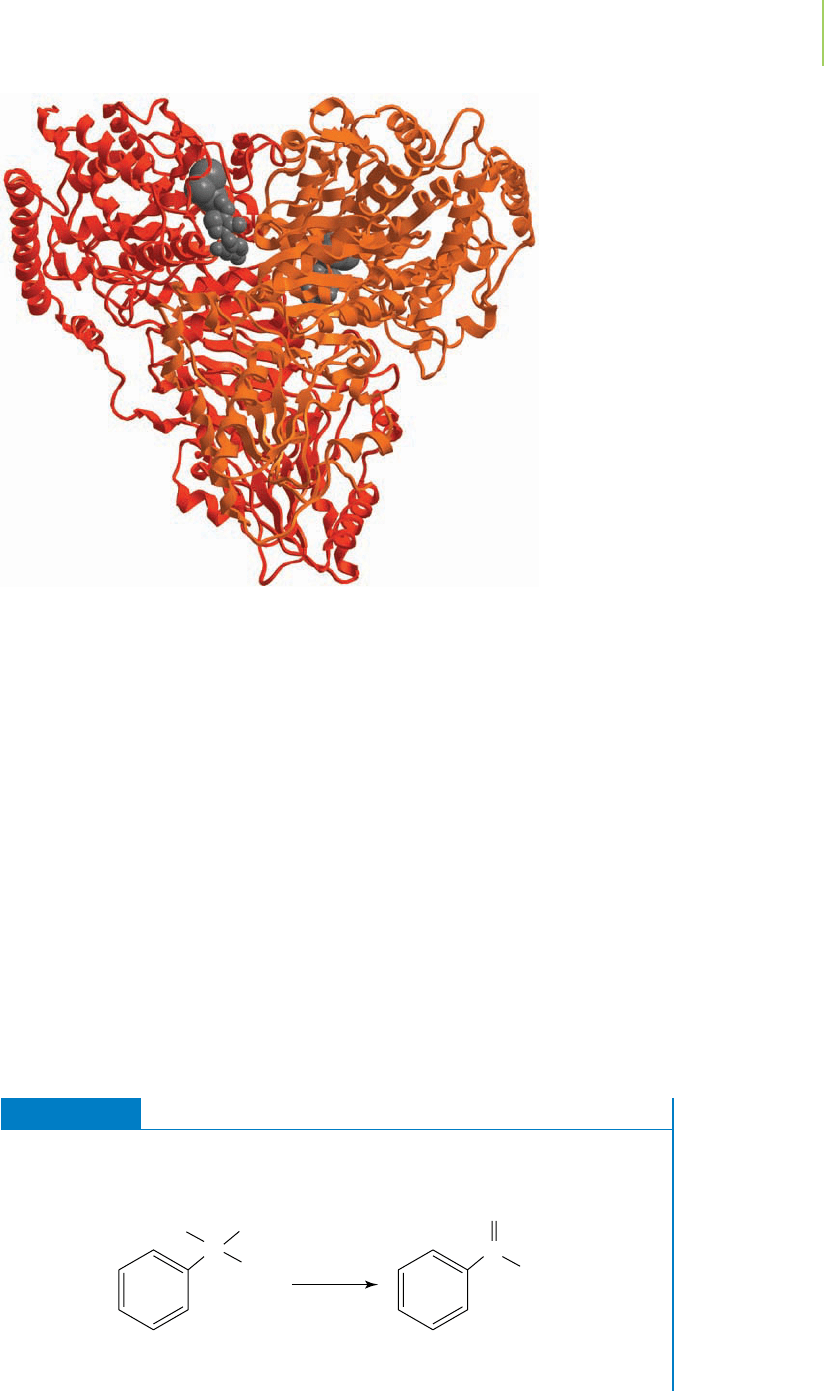
iron ions for incorporation into metalloproteins such as hemoglobin. Many of
the vitamins we must consume in tiny amounts are needed to form the coen-
zymes that combine with specific enzymes and allow them to function.
The General Classes of Enzymatic Reactions
Enzymes catalyze many thousands of different chemical reactions. Fortunately,
these reactions can be classified into just six categories on the basis of the general
type of reaction that is being catalyzed.
■
Oxidoreductases are enzymes that catalyze redox reactions.
■
Transferases are enzymes that catalyze the transfer of groups from one mole-
cule to another.
■
Hydrolases are enzymes that catalyze hydrolysis reactions.
■
Lyases are enzymes that catalyze elimination reactions that remove hydrogen
atoms or functional groups and form alkenes (CPC) in the substrate.
■
Isomerases are enzymes that catalyze the interconversion between isomers.
■
Ligases are enzymes that catalyze the formation of new bonds linking sub-
strates together.
EXERCISE 22.4 What Is It Doing?
Examine the following reaction and classify the enzyme’s activity into one of the six
types of reactions common among enzymes.
Solution continues on page 952.
C
Benzyl alcohol Benzoic acid
H
C
OH
Enzyme
O
OH
H
22.4 Enzymes 949
Vitamin B1 (thiamine) binds within the
structure of yeast transketolase (a trans-
ferase enzyme). The thiamine is shown
as a spacefilling model.
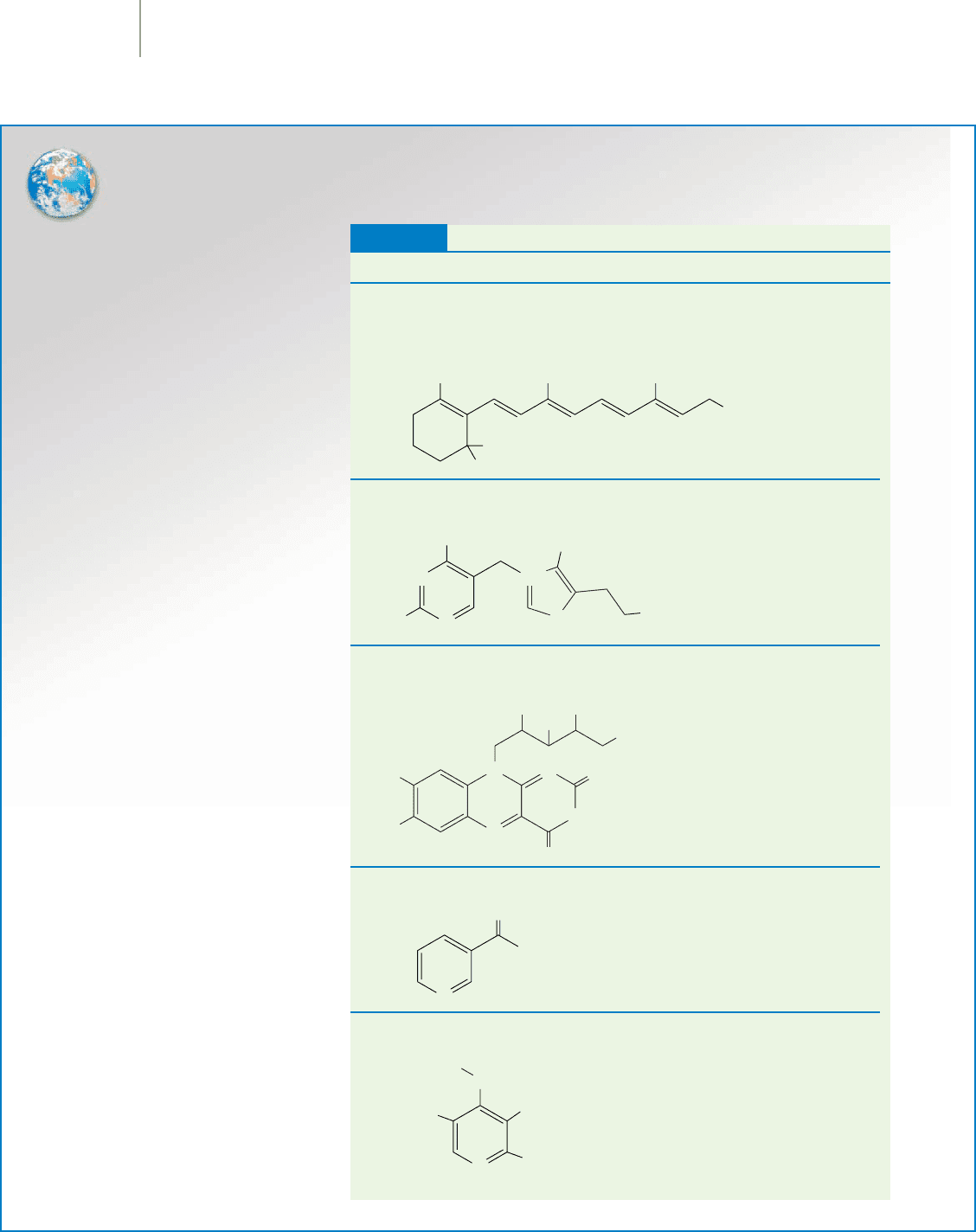
950 Chapter 22 The Chemistry of Life
Vitamins are small molecules that we need
for proper health; most either are not nor-
mally synthesized in our bodies or are
made in insufficient amounts. We humans
obtain most of our needed vitamins from
food. The exception to this is that our bod-
ies can make vitamin D and vitamin K. In
all, we need 13 vitamins to sustain our life:
vitamins A, C, D, E, and K and the B
vitamins (thiamine, riboflavin, niacin, pan-
tothenic acid and biotin, vitamin B6, vita-
min B12, and folate). Each of these vita-
mins plays an interesting role in the
biochemistry of life. Details of these vita-
mins are shown in Table 22.2.
Vitamin D
Vitamin D (calciferol) promotes retention
and absorption of calcium and phospho-
rus, primarily in the bones. Too much vita-
min D in the body may have the opposite
effect of taking calcium from the bones and
depositing it in the heart or lungs, making
them function less efficiently. Because vita-
min D is essential for the body’s utilization
of calcium, a deficiency may result in severe
loss of calcium and, consequently, a soften-
ing and weakening of bones (osteomala-
cia). Extreme vitamin deficiency gives rise
to a disease known as rickets.
Like most vitamins, vitamin D may be
obtained in the recommended amount
with a well-balanced diet, including some
enriched or fortified foods such as milk. In
addition, the liver and kidneys manufac-
ture vitamin D when the skin is exposed to
sunshine. Deficiencies in this vitamin arise
primarily from insufficient exposure to
sunlight. That is why it is recommended
that we get at least 10 to 15 minutes of sun-
shine three times a week.
Vitamin A
Vitamin A (retinol) is supplied by many
foods of both animal and plant origin. Veg-
etables sources, such as carrots, pumpkin,
and brocolli, actually contain a precursor
of retinol called beta-carotene, which is
NanoWorld / MacroWorld
Big effects of the very small:
Vitamins and disease
Selected Vitamins and Their Sources in Food
Vitamin Deficiency Disease Sources in Food
TABLE 22.2
N
NH
2
CH
3
CH
3
OH
N
S
N
N
O
OH
N
CH
2
HO
HOCH
2
CH
3
OH
H
Vitamin A
B1 (thiamine)
B2 (riboflavin)
Niacin
Vitamin B6
Night blindness,
xerophthalmia
Beriberi
Ariboflavinosis
Pellagra
Vitamin B6 deficiency
O
H
Eggs, whole milk, cream, cheese,
liver, green and yellow vegetables
(carrots, squash, sweet potatoes,
spinach, kale, and broccoli)
Ham, pork, milk, fortified cereals,
peanuts, liver, yeasts
Liver and other organ meats,
milk, green vegetables, fortified
cereals, yeast
Peanuts, lean meats, poultry, fish,
bran, yeast, liver
Whole-grain cereal, fish, legumes,
liver and other organ meats, yeast
OH
CH
3
CH
3
N
N
N
O
NH
OH
OH
OH
O
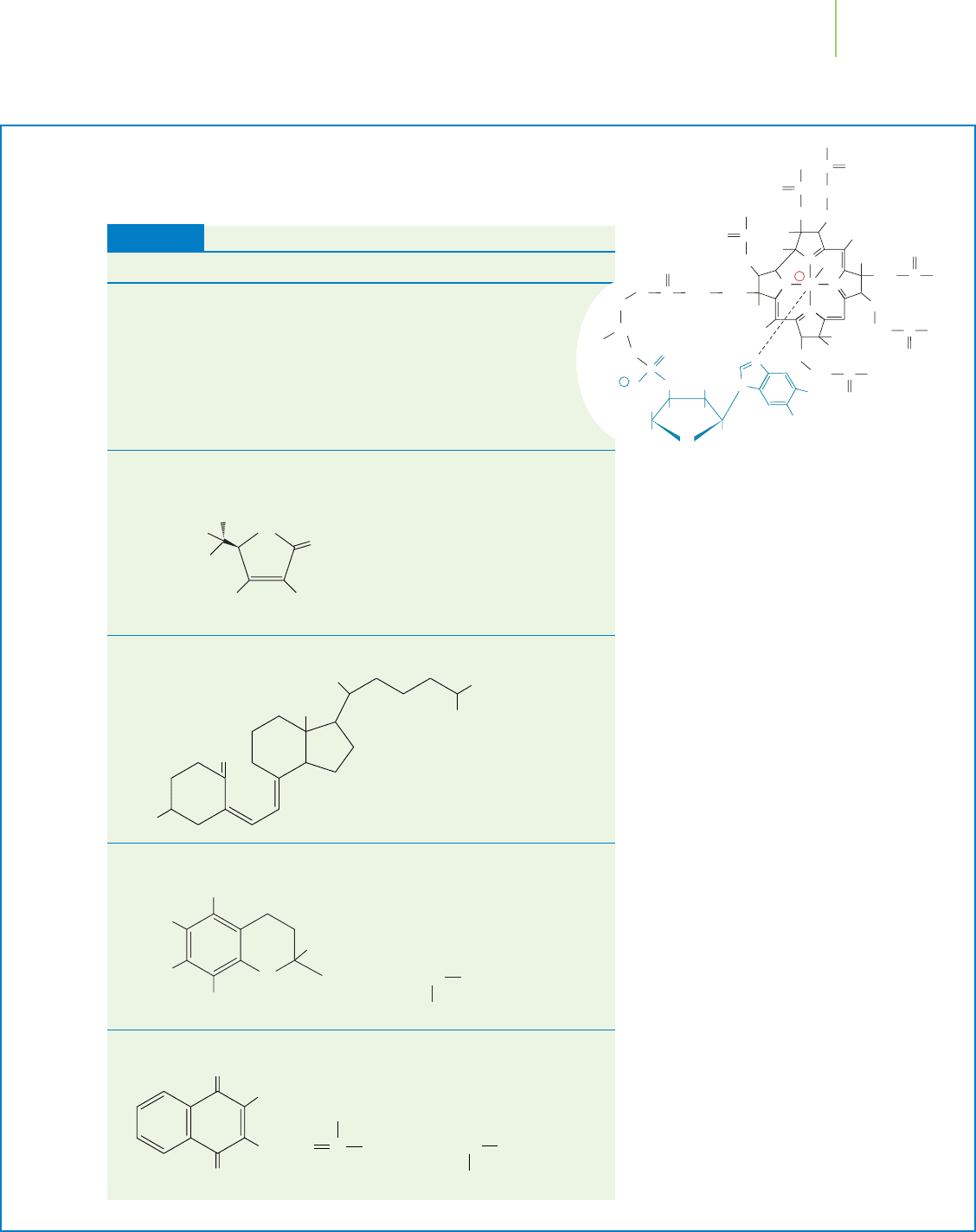
22.4 Enzymes 951
Vitamin B12
Vitamin C
(ascorbic acid)
Vitamin D
Vitamin E
Vitamin K
OHHO
HOCH
2
OH
H
O
O
HO
CH
2
CH
3
CH
3
CH
3
CH
3
O
H
O
CH
3
CH
3
CH
3
CH
3
(
CH
2
CH
2
CH
2
CH
)
3
CH
3
CH
3
O
O
CH
3
CH
2
CH C
CH
3
(CH
2
CH
2
CH
2
CH)
3
CH
3
CH
3
converted into retinol by the body. In the
body, vitamin A is used in the rods and
cones within your eyes to absorb light and
enable you to see. The vitamin also plays an
important role in bone growth, reproduc-
tion, and cell division. Vitamin A has been
implicated in the regulation of your im-
mune system by facilitating the action of
lymphocytes, a type of white blood cell that
fights infection.
Deficiencies in vitamin A rarely occur
in the United States but are very common
in poor and developing countries. Night
blindness and xerophthalmia (damage to
the cornea of the eye) are the results of this
deficiency. These conditions lead to as
many as a half-million cases of blindness
each year and, according to the World
Health Organization, account for 70% of
all childhood blindness in developing
countries. Recent advances in treating
this preventable disease have included the
development of so-called golden rice, a
genetic hybrid of rice that produces beta-
carotene. Its use in countries where the
staple food is rice has been quite suc-
cessful in reducing the number of cases of
blindness.
Vitamin E
Vitamin E (alpha-tocopherol) is found in
corn, nuts, seeds, olives, spinach, asparagus,
and other green leafy vegetables and in
products made from them, such as mar-
garine. This vitamin is often touted as
“the body’s antioxidant.” Considerable evi-
dence suggests that it prevents the natural
Eggs, milk, liver
Fresh fruits and vegetables
(oranges and other citrus
fruits, Brussels sprouts,
cabbage, etc.)
Fortified milk, fish liver oil
Vegetable seed oil, egg yolk,
cereals, beef liver
Leafy green vegetables, liver
(Continued)
Vitamin Deficiency Disease Sources in Food
TABLE 22.2
Pernicious anemia
Scurvy
Rickets
Vitamin E deficiency
Vitamin K deficiency
See drawing at right.
C
Co
+
OH
N
N
N
N
N
O
OH
H
H
H
HOCH
2
CH
3
CH
3
O
O
O
P
H
N
N
H
CH
2
CH
3
CH
2
CH
2
CH
3
CH
2
CH
3
NH
2
C
O
C
O
O
CH
2
CH
2
CH
2
CH
2
NH
2
C
O
CH
2
NH
2
C
O
CH
3
H
2
C
H
3
C
H
3
C
O
NH
2
CO
H
2
N
H
2
C
H
2
C
H
3
C
H
3
C
CH
H
3
C
CO
H
2
N
–
continued
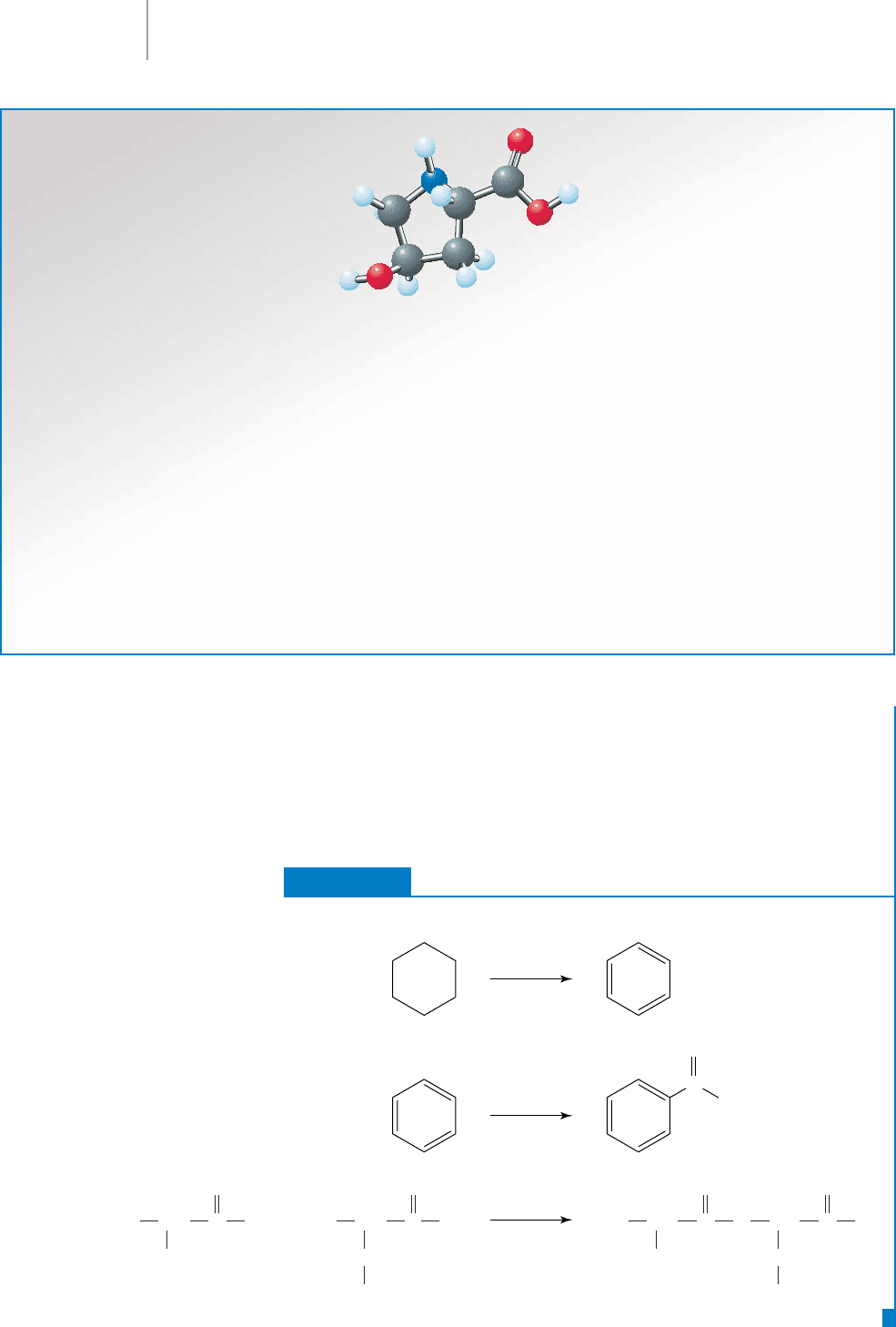
952 Chapter 22 The Chemistry of Life
oxidation of lipoproteins, which play an
important role in the development of
atherosclerosis, the disease process that
leads to heart attacks and strokes.
Vitamin C
Vitamin C (ascorbic acid) has many
functions in the body, including assist-
ing in the absorption of iron. This vita-
min is found in citrus fruits, such as lemons and limes,
and in most other vegetables. It is an component of en-
zymes involved in the synthesis of collagen. Without vita-
min C, the enzymatic preparation of collagen still pro-
ceeds, but the resulting collagen protein doesn’t include
the modified amino acid known as hydroxyproline. Col-
lagen with hydroxyproline forms strong intermolecular
forces of attraction between strands of the collagen pro-
tein. Without hydroxyproline, the collagen cannot form
these strong attractive forces. The result is nothing short
of the breakdown of the human body. Deficiency in vita-
min C, known as scurvy, is evidenced by sore joints, loss
of teeth, and aching muscles. Severe deficiencies and un-
treated deficiencies result in respiratory failure.
Abnormally large doses of vitamin
C appear to be harmless at the least,
and they may be helpful. Because vita-
min C is water soluble, excess vitamin
C can be easily excreted from the
body. Linus Pauling (remember him
from Chapter 8) suggested that
vitamin C may play a crucial role in
the maintenance of a healthy immune
system. He proposed that massive
doses of vitamin C (as high as 1000 mg/day) may even
reduce the frequency and severity of the common cold.
Recent research suggests that this may, in fact, be true.
Vitamin B1
Vitamin B1 (thiamine) is found in cereals, breads, and
pasta. This vitamin, like vitamin C, is one of the water sol-
uble vitamins. Deficiency in vitamin B1 leads to fatigue,
psychosis, and even nerve damage. Extremely severe defi-
ciencies result in beriberi, a condition that is character-
ized by nerve degeneration and muscle disease and that
affects the function of the heart. This disease is prevalent
in developing countries such as those in eastern and
southern Asia. In developed countries, it is rarely found.
4-Hydroxyproline
Solution
At first glance, it appears that the substrate (benzyl alcohol) might be converted into
the product (benzoic acid) by a lyase, because there is a double bond formed in the
product. However, this double bond is not an alkene. Further examination of the
oxidation states of the carbon atoms in the molecule reveals that one of them is un-
dergoing oxidation. Therefore, this reaction is catalyzed by an oxidoreductase.
PRACTICE 22.4
Indicate what type of enzyme is responsible for each of these transformations.
See Problems 19 and 20.
Enzyme
O
CH
3
C
Acetal CoA
Enzyme
Enzyme
H
2
N
CH
3
CH C
O
H
N
H
2
N
CH
3
CH C
O
OH
H
2
N
CH
2
CH C
O
SH
CH
2
SH
OH
CH C
O
OH
NanoWorld/MacroWorld (continued)
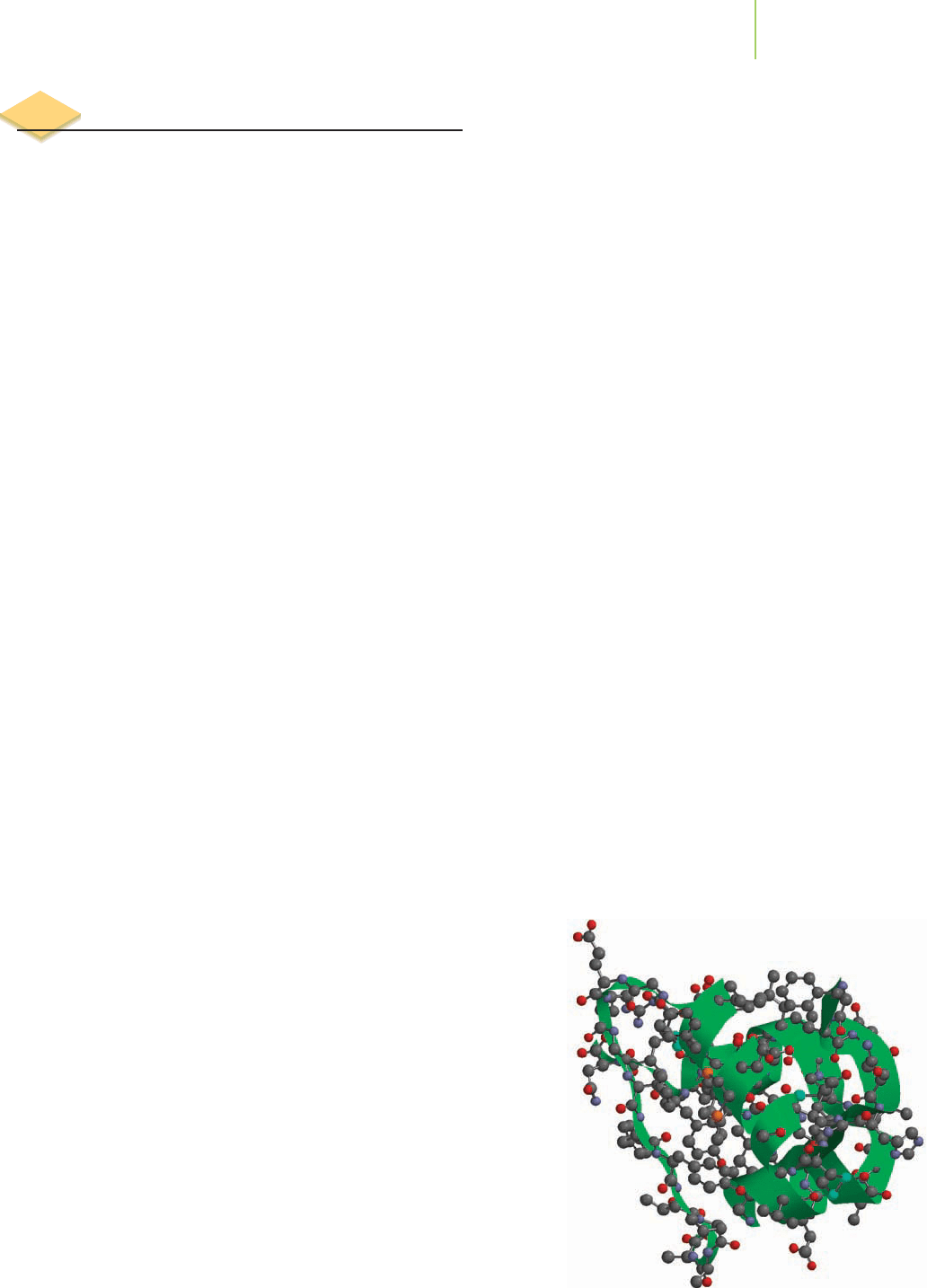
Insulin
22.5 The Diversity of Protein Functions
One way of summarizing the relationship between genes and proteins—the two
central categories of chemicals that sustain life—is to say that “genes hold the in-
structions while proteins do the work.” In a human, our 20,000 to 30,000 genes
encode the structure of proteins, and each protein has its own specialized task, its
own little bit of “chemical work” to do. There is often simplicity at the heart of
complexity, however, and proteins are no exception. Almost everything they
achieve can be explained in terms of three fundamental activities. Selective bind-
ing, catalysis, and conformational change are the three keys to understanding the
activities of proteins. Here is a brief list of the main tasks these three operational
principles enable proteins to achieve.
Proteins as Enzymes
Some proteins contain active sites that bind substrates and catalyze reactions to
make products, the main subject of Section 22.4.
Proteins as Transporters
Many proteins bind to specific chemicals at particular sites and then release their
cargo at other sites. The protein hemoglobin, for example, binds to oxygen mol-
ecules in the lungs, transports the oxygen through the blood, and then releases it
in the tissues of the body that need oxygen to survive.
Proteins as “Movers and Shakers”
What in your body makes you move? You move because you have muscles. Mus-
cles are composed of filamentous contractile proteins. These are proteins that re-
spond to stimuli from nerves to undergo conformational changes that result in
their being ratcheted past one another and causing the whole structure of a mus-
cle to contract. Reversal of the process enables the muscles to relax.
Proteins as Scaffolding and Structure
Much of the shape and structure of cells, tissues, organs, and the body as a whole
is maintained by strong fibrous structural proteins that form fibers and pillars and
sheets of material. Hair, skin, connective tissue, and an intricate skeleton of
tubules within all cells are composed of structural proteins.
Proteins as Messengers
Proteins that are made at one place in the body can be transported
through the blood to other parts of the body, where they bind to other
chemicals to initiate specific biochemical responses. Some such pro-
teins are known as
hormones. The protein insulin, for example, is a
hormone that is released from the pancreas and then binds to cells
and assists in the uptake of glucose into these cells. A deficiency in this
hormone or in its production causes diabetes.
Proteins as Receptors
The outermost portion of the cell, known as the cell membrane, is studded
with proteins that act as receptor molecules. These receptors bind to specific mes-
senger molecules, some of which are proteins like insulin, and then participate in
acts of catalysis or conformational change that initiate the effect that the messen-
ger elicits. Protein receptors also exist inside of cells. The interactions between re-
ceptors and messengers are vital in controlling cell growth. This makes disorders
in these systems very significant in the onset of serious diseases such as cancer.
22.5 The Diversity of Protein Functions 953
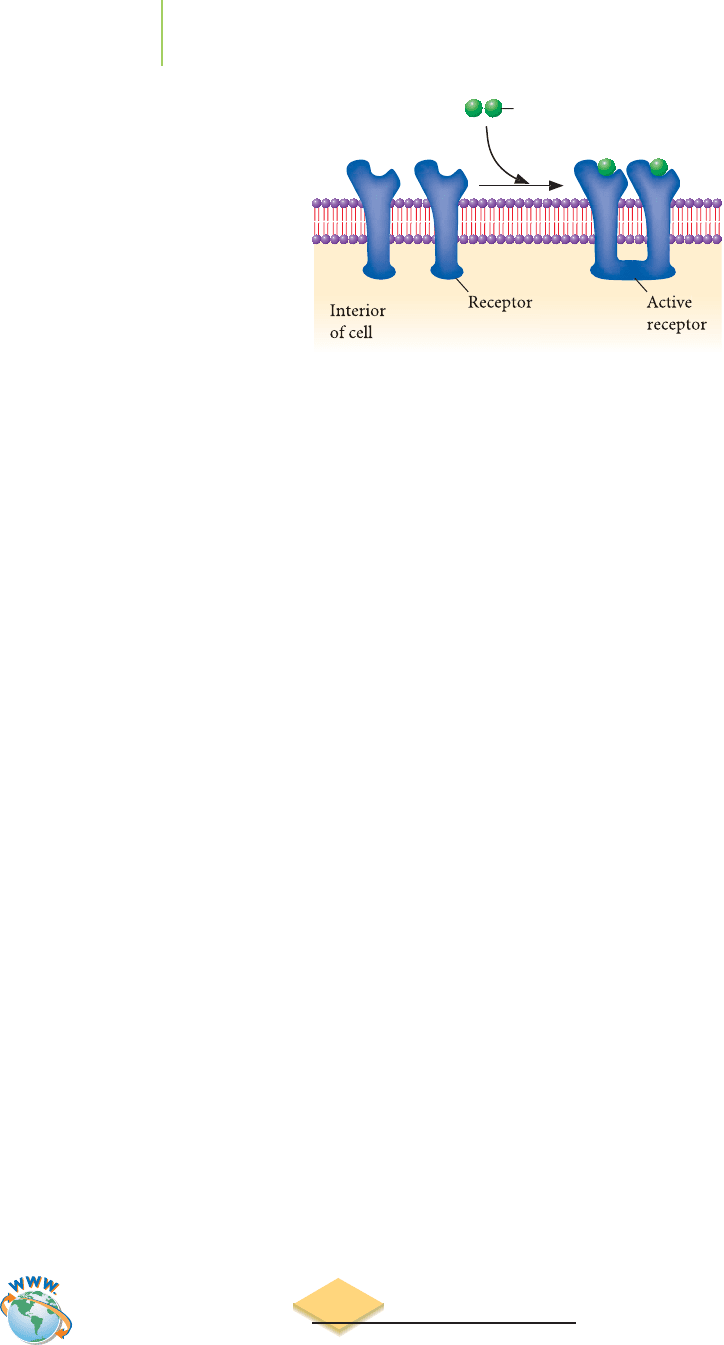
Proteins as Gates and Pumps
Cell membranes act as very selective barriers, through which only specific chem-
icals can pass, and only at appropriate rates and at appropriate times. Much of
this selective movement of chemicals into and out of cells is maintained by pro-
teins spanning the cell membrane. Some of these proteins can simply open or
close a hole in the membrane, allowing selected chemicals to pass. Others act
more like pumps; that is, they transport a chemical across a membrane in such a
way that a significant difference can build up between the concentration of the
chemical on one side of the membrane and its concentration on the other side.
Proteins as Controllers
A whole battery of proteins known as regulatory proteins serve the function of
controlling other proteins, and controlling genes, by binding to them and switch-
ing them on or off. In most cells of the body, for example, only a small proportion
of the genes in the cell nucleus must be active at any one time. Switching the right
genes on and off at the correct times is largely achieved by the activities of regu-
latory proteins.
Proteins as Defenders
The immune system, which defends us against disease, is a network of interacting
cells and chemicals, and many of its most significant chemicals are proteins. Most
famous of all are the
antibodies—proteins that selectively bind to foreign chemi-
cals and assist in their elimination from the body. Allergies such as hay fever result
when this system goes wrong by eliciting too strong a reaction against relatively
harmless foreign chemicals. When it goes wrong by attacking the body’s own tis-
sues, serious autoimmune diseases such as rheumatoid arthritis can result.
Glorious Complexity
The actions of genes and proteins are part of a very complex picture of the bio-
chemistry of life. All of that complexity is, at heart, simply chemistry, driven by
the interactions of energy, charge, and force. However, genes and proteins aren’t
the only players. There are many other compounds involved in the smooth oper-
ation of a living being. Carbohydrates and lipids are two important classes of the
compounds of life.
22.6 Carbohydrates
Most people love carbohydrates. Runners eat copious amounts before a very long
race. Snackers munch on carbohydrates in front of the TV. Toddlers often will
drop everything else to get a small taste of a
carbohydrate. What are carbohydrates
and why do our bodies require them?
This class of compounds shares the general
954 Chapter 22 The Chemistry of Life
H
o
rm
o
n
e
E
x
te
ri
o
r
o
f
ce
ll
Extracellular protein receptors.
Video Lesson: Carbohydrates
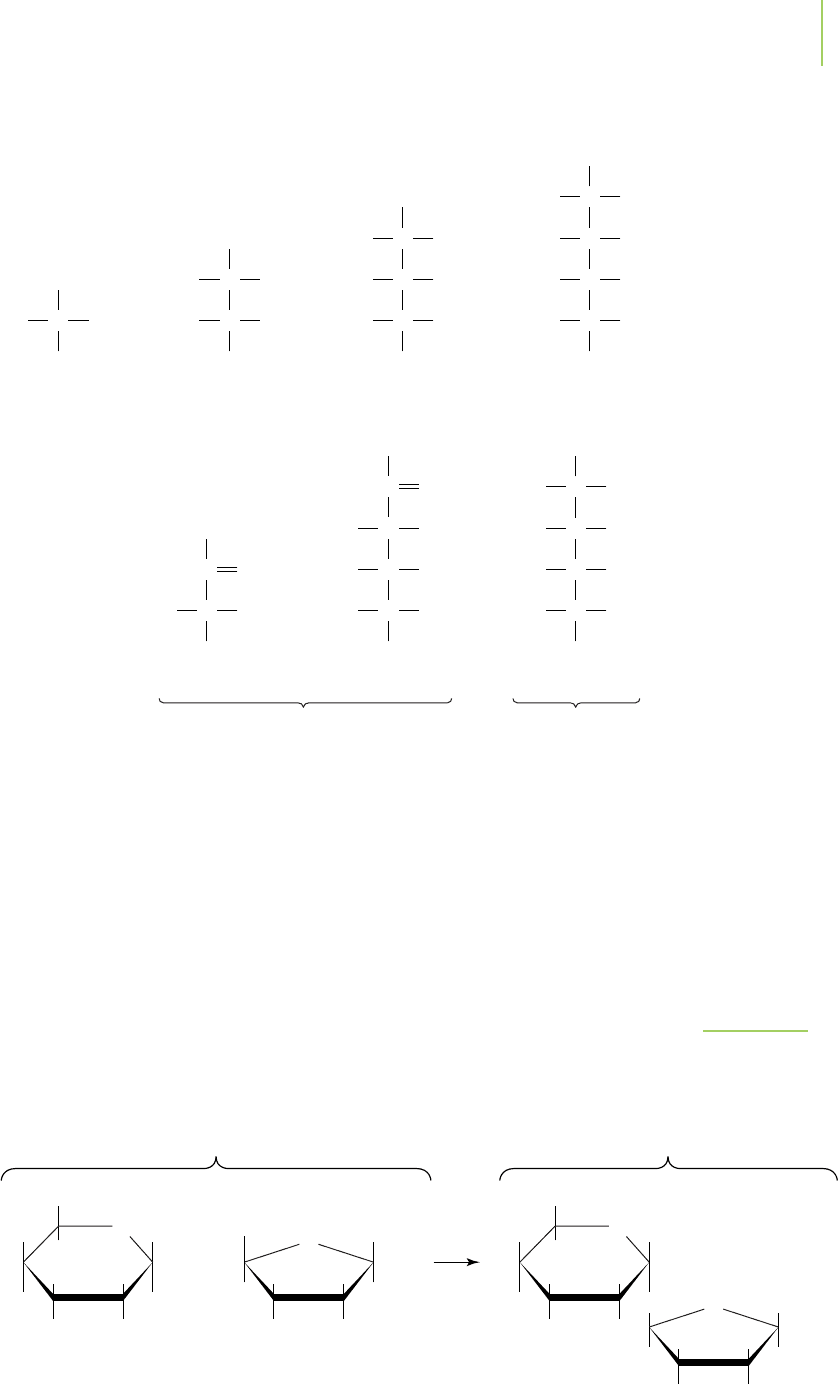
formula C
x
(H
2
O)
y
—historically, they were known as hydrates of carbon, hence
their name. The simplest carbohydrates are
sugars, which are known as triose sug-
ars if they contain three carbon atoms per molecule, tetrose sugars with four car-
bons, pentose sugars with five carbon atoms per molecule, hexose sugars with six
carbon atoms per molecule, and so on. In addition, the carbohydrates can be clas-
sified on the basis of the type of functional group (see Chapter 12). For example,
glucose is an aldose because it contains an aldehyde functional group. Fructose is
a ketose because it contains a ketone functional group. The glucose used in med-
ical drip-feeding is an aldohexose (from aldose and hexose) and is the main form
in which carbohydrate circulates in our blood.
The familiar table sugar we may add to coffee is sucrose and is formed when
two simpler hexose sugars, glucose and fructose, become linked together in a con-
densation reaction, as shown in Figure 22.24. You’ll immediately notice a differ-
ence between the sugars in Figure 22.24 and those from our previous discussion.
22.6 Carbohydrates 955
CH
2
OH
Glyceraldehyde
HC
CHO
OH
CH
2
OH
Erythrose
HC
CHO
OH
HCOH
CH
2
OH
Ribose
HC
CHO
OH
HCOH
HCOH
CH
2
OH
Glucose
Triose Tetrose Pentose Hexose
HCOH
HCOH
HCOH
HO C
CHO
H
Classification of saccharides by number
of carbon atoms.
CH
2
OH
Erythrulose
HC
CH
2
OH
OH
C O
CH
2
OH
Fructose
HCOH
HCOH
CH
2
OH
Glucose
Aldose
HCOH
HCOH
HCOH
HO C
CHO
H
HO C H
CH
2
OH
C
O
Ketose
Classification of saccharides by type of
functional group.
FIGURE 22.24
The condensation of glucose with fruc-
tose gives sucrose. Monosaccharides in-
clude glucose and fructose. Sucrose is a
disaccharide.
HO OH
H
O
OH
HOH
CH
2
OH
Glucose Fructose Sucrose
H
H
OHH
HOCH
2
H CH
2
OH
OH
O
H
HOH
O
H
O
HO
HOH
CH
2
OH
H
H
CH
2
OH
H
HOCH
2
H
H
O
OH
HOH
HO
Monosaccharides Disaccharide
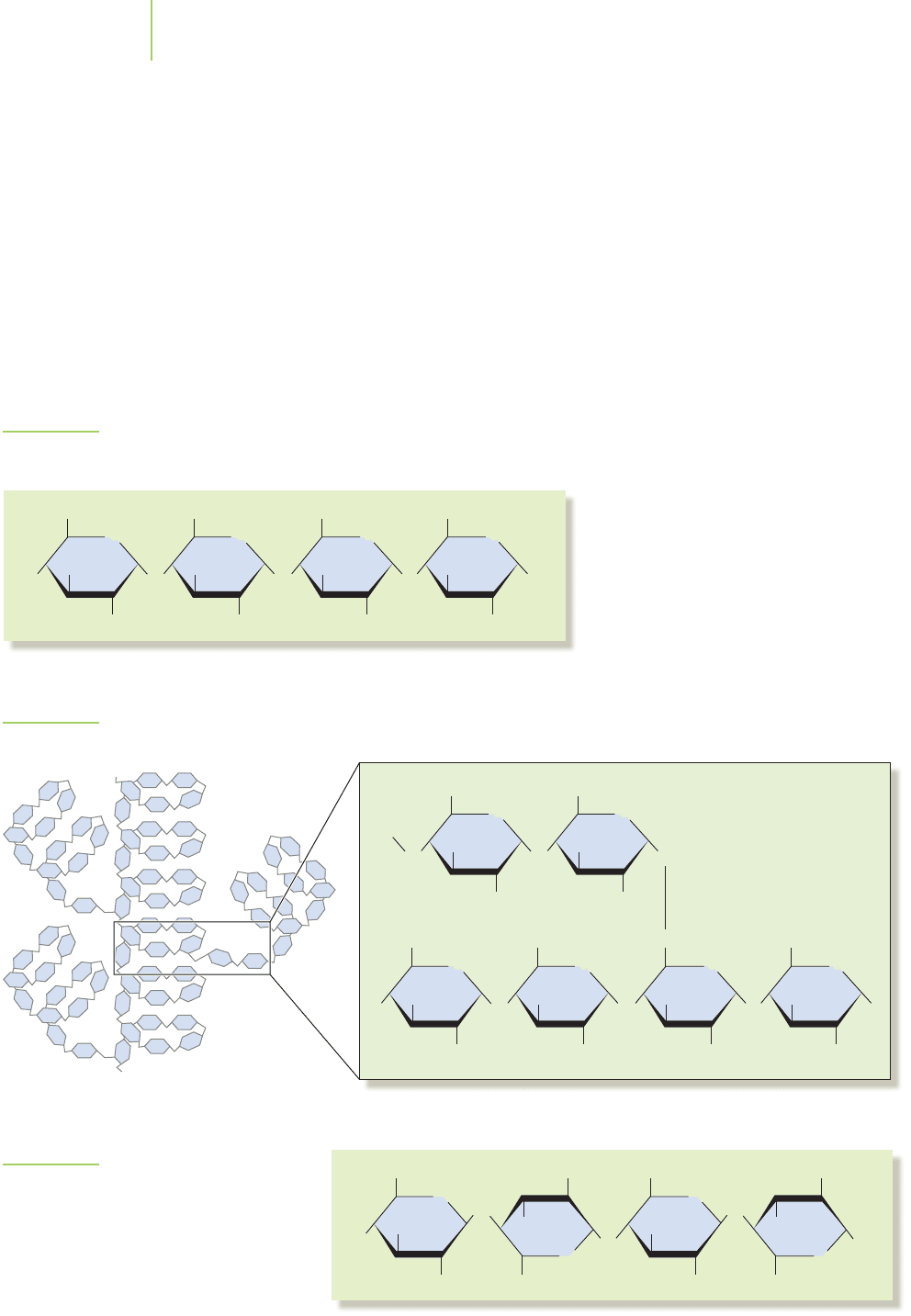
Why? Most carbohydrates undergo a condensation reaction within their
own structures when they are placed in aqueous solution. The result is a group
of cyclic structures that are more stable than the straight-chain carbohydrates.
Sugars such as glucose and fructose are also known as
monosaccharides (for
“single sugars”), whereas those like sucrose, made when two monosaccharides
combine, are
disaccharides. Note that two cyclic sugars, one glucose and one fruc-
tose, have come together to form the disaccharide, as shown in Figure 22.24.
One major role for carbohydrates in living things is to serve as energy storage
compounds. For long-term storage, monosaccharides are linked up into giant
polymers known as
polysaccharides. The major storage polysaccharide in plants is
starch, composed of many glucose monomers linked in the manner shown in
Figure 22.25. Foods such as rice or potatoes supply us with energy largely thanks
to the deposits of starch within them, whose role in the plant is to provide the en-
ergy needed to sustain its growth. Animals, including humans, contain a slightly
different polymer of glucose called glycogen, in which the glucose monomers are
linked together in a slightly different fashion, as shown in Figure 22.26. Another
important polysaccharide is cellulose, which is a polymer of glucose that forms
much of the framework of plant cell
walls. The glucose monomers are
linked together in a completely differ-
ent manner, as shown in Figure 22.27.
Humans lack the enzyme capable of
hydrolyzing cellulose into glucose, so
cellulose contains no nutritional value
to us.
956 Chapter 22 The Chemistry of Life
FIGURE 22.25
Starch is a polymer of glucose units
linked together as shown.
OH
O
OOO
OH
OH OH OH OH
OH OH
HO
CH
2
OH
O
CH
2
OH
O
CH
2
OH
O
OH
CH
2
OH
FIGURE 22.26
Glycogen is a polysaccharide.
OH
O
OO
OH
OH OH
OH
O
CH
2
OH
O
CH
2
OH
O
OOO
OH
OH OH OH OH
OH OH
CH
2
OH
O
CH
2
OH
O
CH
2
O
CH
2
OH
FIGURE 22.27
Cellulose is a polymer of glucose units linked to-
gether as shown. What is the difference be-
tween cellulose and starch (Figure 22.25)? Note
the position of the OH on the glucose monomer
at the right. It is pointed in a direction different
from the direction it would point in starch.
O
OO
O
OH
OH
OH
OH
OH
OH OH
HO
CH
2
OH
O
CH
2
OH
O
CH
2
OH
O
OH
CH
2
OH
OH
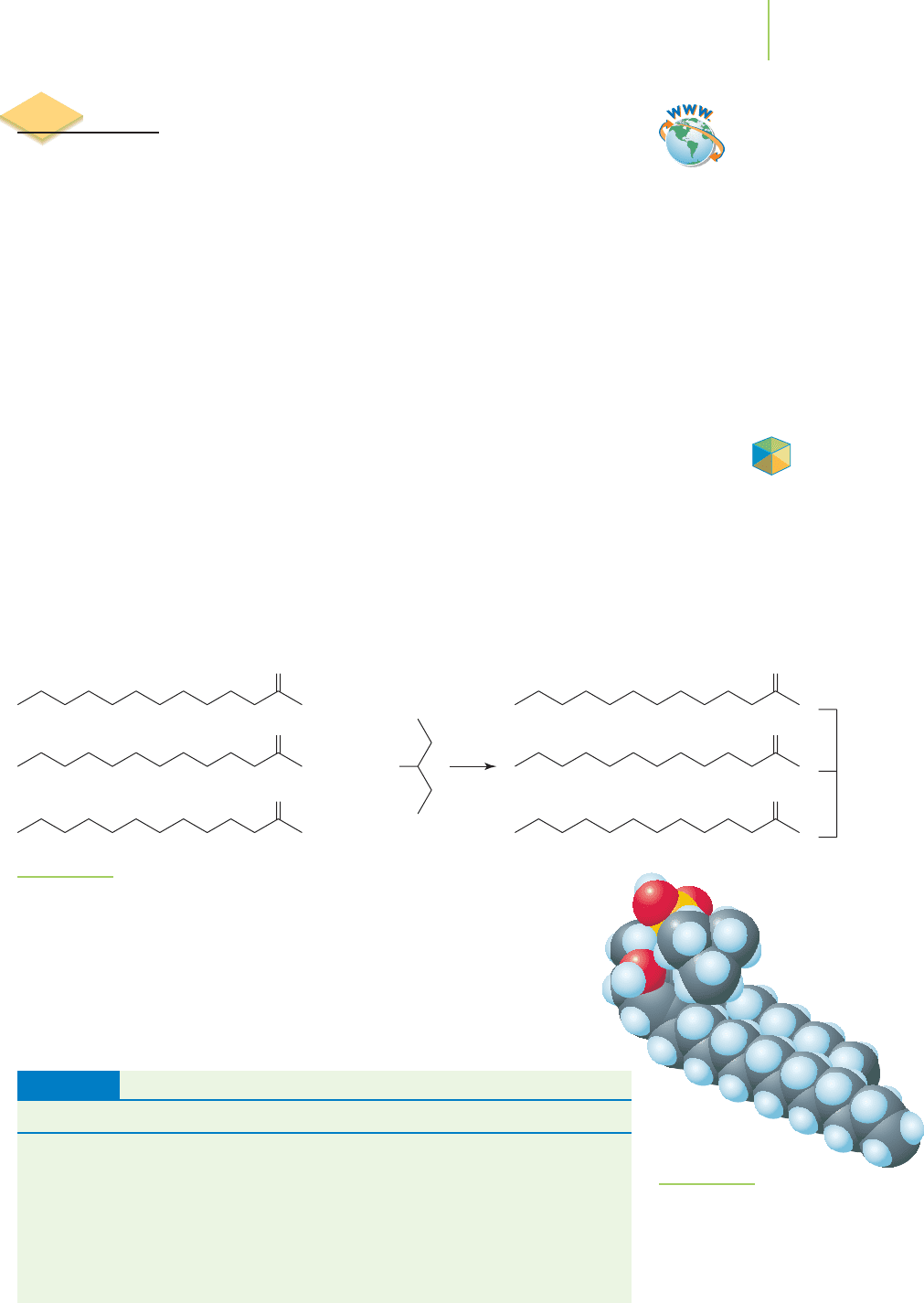
22.7 Lipids 957
FIGURE 22.28
Triacylglycerides result from the condensation of three fatty acids and glycerol.
HO
HO
HO 3H
2
O
O
O
O
O
O
O
OH
O
OH
O
OH
O
Some Common Fatty Acids
Common Name Formula Melting Point
Lauric acid CH
3
(CH
2
)
10
COOH 46°C
Myristic acid CH
3
(CH
2
)
12
COOH 55°C
Palmitic acid CH
3
(CH
2
)
14
COOH 64°C
Stearic acid CH
3
(CH
2
)
16
COOH 69°C
Oleic acid CH
3
(CH
2
)
7
CHPCH(CH
2
)
7
COOH 13°C
Linoleic acid CH
3
(CH
2
)
4
CHPCHCH
2
CHPCH(CH
2
)
7
COOH −5°C
TABLE 22.3
22.7 Lipids
Lipids are a very broad class of compounds that differ from most other classes of
compounds. For example, the molecules known as carbohydrates exhibit similar-
ity in structure and function. Lipids do not have similarity in structure or func-
tion. A compound is characterized as a
lipid solely on the basis of its solubility in
nonpolar solvents. Lipids include fats, oils, some hormones, and some vitamins.
Lipids function as important energy storage molecules, act as intercellular signal-
ing molecules, and also play many structural roles in living things. For example,
the thin membranes around every living cell are composed of lipids.
Some of the simplest lipids are the
fatty acids, which are long-chain carboxylic
acids that may contain one or more CPC double bonds. Table 22.3 lists some of
the common fatty acids. When three fatty acids combine with the tri-alcohol
glycerol in an esterification reaction, a
triglyceride (triacylglycerol) is formed.
Figure 22.28 shows an example of this reaction. Triglycerides that are solid at
room temperature are called
fats, whereas those that are liquid at room tempera-
ture are
oils. We explored this distinction in Chapter 10 when examining the
effects of CPC double bonds on the melting points of fats and oils.
Triglycerides can be modified in various ways to form compound lipids, such
as the
phospholipids that are important components of cell membranes (see Fig-
ure 22.29). Living things also contain a great many derived lipids, which are fatty
substances that can be made from simpler lipids but have their own unique struc-
tures. One of the major classes of derived lipids consists of the
steroids, which
share a characteristic four-ring structure and include cholesterol and various
Application
FIGURE 22.29
Sphingomyelin is one of the components
of cellular membranes.
Video Lesson: Lipids
